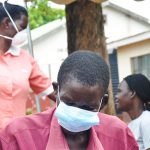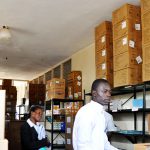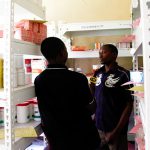UCCM Tracking Global Fund Money up to the Beneficiary-Mobilising funds for the country’s fight against HIV/ AIDS,TB and Malaria
As the in-country Global Fund Board in Uganda, the Uganda Country Coordinating Mechanism (CCM) for the Global Fund (GF) ensures that all GF grant funds sent to Uganda reach the intended beneficiaries in time. To carry out this mandate, the Uganda CCM has representatives from different government, non-government, civil society, private sector and donor agencies in the country. These form the Uganda CCM Board whichmobilises, develops and submits requests for continued funding to the Global Fund. The CCM board also oversees the management and implementation of approved Global Fund grant funds/programs in Uganda, selects and nominates Principal Recipient (PRs) whose role is to implement the approved Global Fund grants and programme activities.
All Global Fund grant funds are given for fighting HIV/AIDS, Tuberculosis (TB) and Malaria in the country, so these funds are used to provide prevention, treatment and care services and commodities for the three diseases. The Global Fund also allocates funds for Health Systems Strengthening (HSS) in the country.
[blockquote_right]
People were dying, and everything indicated that more were set to die. In Gulu district alone, 30 deaths were reported on 6th July 2015 and many more were still at risk. Malaria had struck once again, and 10 districts in Northern Uganda were the most affected.
Within months, news of a generalized upsurge of malaria cases across the country had been reported, leading to an increased consumption of anti-malaria medicines above the regular amounts.
As a result, Uganda was experiencing anti-malarial medicines stock out rates of 45% compared to 34% before the epidemic. By April 2016, one year after the malaria epidemic started, 658 people had died and 1,005,632 had been affected by the disease.
[/blockquote_right]
Mobilising funds for the country’s fight against HIV/ AIDS,TB and Malaria
The Uganda Country Coordinating Mechanism (CCM) for the Global Fund followed the epidemic with interest. As the Global Fund’s in-country Board, the CCM’s mandate is to oversee the utilization of Global Fund funds and it mobilizes millions of Global Fund grant funds for the prevention and management of HIV/AIDS, TB and Malaria. Only months before the epidemic, the CCM had mobilised $191,777,489 from the Global Fund to meet the funding gaps in
the management and prevention of Malaria between 2015 and 2017.
Fast forward to May 2016, and the CCM was yet again submitting two applications to the Global Fund for additional funding of USD $78,862,462 . This additional request was partly prompted by the generalized malaria upsurge across the country coupled with the Malaria epidemic in Northern Uganda. Of this funding, USD $42,238,483 will address funding gaps in the provision of essential malaria treatment and case management services in Uganda. The remaining USD $36,623,979 will address funding gaps in the provision of HIV testing services and buying medicines for treating people living with HIV in Uganda.
CCM Oversight Visits to Program Implementation Sites
The CCM visits sites that provide Global Fund supported medicines, testing and treatment services as part of its oversight role over Global Fund grant funds in Uganda. Between May and June 2016 the CCM visited Kalangala district, Masaka district and the National Drug Authority (NDA) headquarters and laboratories in Kampala. The visit to NDA
followed the procurement of high performance testing machines for mosquito nets and anti-HIV, TB and Malaria medicines. Thanks to Global Fund support, NDA is now better equipped to effect timely testing and clearance of mosquito nets, HIV, TB and malaria medicines.
The site visits to Kalangala and Masaka districts enabled the CCM to understand the supply chain of health commodities provided with Global Fund support and the health services delivery system through which services reach the intended beneficiaries. The site visit also focused on access to reproductive and maternal health services/
referral system in the hard to reach and most at risk populations of Kalangala Island communities.
Playing Your Role
The visiting CCM team established that services reach the intended beneficiaries in time in spite of health workers face in delivering services to the 64 Island communities. However, the public is not aware that it has a role to play to ensure proper utilization of these medicines and other health care services supported by the Global Fund.
For instance, Masaka and Kalangala districts have many unsung heroes in the form of health workers who do everything in their power to serve and treat patients despite the challenging working conditions.
However, although motivated medical staff is available, patients do not go to the health facilities because they prefer to be reached at the community level. Some people living with HIV openly revealed that they get tired of swallowing medicines, so they throw them away or feed them to animals. Likewise, TB patients rarely complete their doses, leading to MDR TB which is more expensive and diffi cult to treat. In some cases, mosquito nets are misused,
frustrating the Global Fund’s fi ght against malaria in Uganda.
Nevertheless, it was gratifying to see that Global Fund supported medicines and health care services generally reach the intended beneficiaries and are making an impact in all the areas visited by the CCM. As Dr. Stuart Musisi, the District Health Officer (DHO) of Masaka district, pointed out, malaria cases in his area of operation have gone down because of Global Fund support. “I do not doubt the significance of Global Fund support and the work the CCM is
doing to ensure that we get all the resources from the Global Fund. Before I became DHO three months ago, malaria was the number one killer in many sub counties in Masaka district. It has now moved to number two, thanks to the resources we receive through the Global Fund. If this is sustained and is expanded to all sub- counties, I am sure that I will see positive results in my district within two years,” Musisi said.
For more information, please don’t hesitate to contact us





